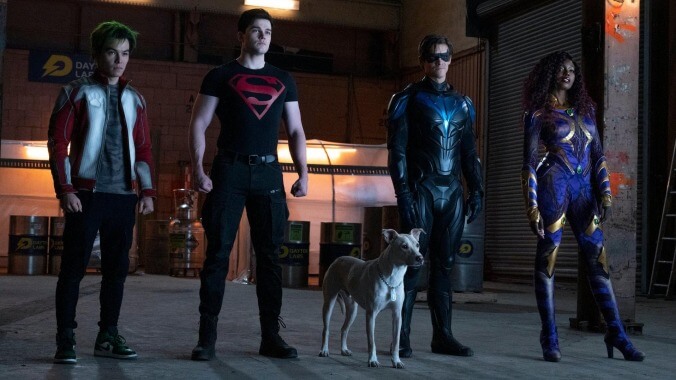Titans was actually good for about three episodes
As DC's dark superhero show starts its final season on HBO Max, let's remember that brief time when the Titans gave viewers reasons to really care

Three episodes into season three of the superhero drama Titans, Hank is in trouble. He’s got a bomb hooked up to his heart that’s counting down each beat, placed there by his ex-teammate (and ex-Robin) Jason Todd. But Hank’s current teammate, Conner, is working on a deactivation device, and he’s close, so close, to a 100 percent success rate. When he finishes, Conner’s got less than 10 heartbeats to run from the Batcave to Hank’s room somewhere above in Wayne Manor. But that’s not a problem for Conner—he’s Superboy, half Superman and half Lex Luthor. He’s inherited Superman’s speed and Lex’s smarts, which makes him just about the ideal person for Hank to have on his side right now. And he’s going to make it, there’s no doubt about it; Conner’s at Hank’s door with roughly five beats to go. If he made it all the way across a mansion in five, he’s going to be able to cross a room, hook up the deactivator, and save Hank in that same amount of time. You can feel it, the moment when the tension is just about to release, when everything is going to be okay. And then, with five beats still left on the timer, Hank explodes.
Titans, which first aired in 2018 on the now-defunct streaming service DC Universe, starts its fourth and final season April 13 on HBO Max. It was one of the flagship series for DC Universe—along with Doom Patrol, Swamp Thing, and Stargirl—at a time when DC was trying to create a home for shows that were too dark, violent, or crass for The CW, which had long been the studio’s broadcast home for more conventional superhero fare like The Flash and Arrow.
Titans centers on a grown-up version of the Teen Titans superhero team as they take on a massive, potentially world-ending threat and band together to protect a teenage girl with immense powers. (In the comics, the team usually includes some combination of Robin, Wonder Girl, Superboy, Kid Flash, Aqualad, and various other sidekicks and young heroes.) And while the Teen Titans comics sometimes take on a more serious tone, it’s still a far cry from the TV show’s anguish.
From the start, Titans had an attitude problem. The first thing Dick Grayson (Batman’s first Robin) says in the show is “Fuck Batman.” With its inelegant teenage angst, it’s a line that would suit a gritty take on the Teen Titans, which is what the show purports to be. But Dick’s an adult here, and that mismatch in tone and story plagues the show’s first two seasons. This isn’t a dark take on the Teen Titans. The characters would have to be actual teenagers for that to work. This is a dark take on adults who are stuck in a state of arrested development, and Titans is not subtle about their baggage. The grimdark edgelord vibes make sense for a show about a bunch of teenagers who’ve been through some shit; it gets a little more trying when they’re just adults with poor coping skills.
After Dick’s outburst, it takes a little while for Titans to get the team together. Dick’s a Detroit detective by day and Robin (sans Batman) by night. (The show makes it clear that he definitely does not want to talk about Batman.) In his younger days, he fought crime with Wonder Girl, a.k.a. Donna Troy, and Hawk and Dove, a.k.a. Hank Hall and Dawn Granger. When a teenager with superpowers named Rachel Roth seeks him out for protection, Dick goes to Donna, Hank, and Dawn for help. Kory, a woman who suffers from amnesia but seems inexplicably drawn to Rachel, also shows up.
Throughout the first two seasons, Dick also attracts a few more young hangers-on, including Conner Kent, a.k.a. Superboy, and Garfield Logan, a.k.a. Beast Boy, leading him to question whether he should re-form the Titans. From his implications, it didn’t exactly go well the first time with Donna, Hank, and Dawn, and he’s got performance anxiety about stepping into a leadership position. Questioning whether he should re-form the team when Something Bad clearly happened in the past to drive them apart, having anxiety over mentoring younger people when he never really had a positive adult role model himself (aside from Alfred)—these are realistic and understandable problems for Dick to be dealing with, but they’re handled with all the subtlety of, well, “Fuck Batman.”
 Keep scrolling for more great stories.
Keep scrolling for more great stories.
